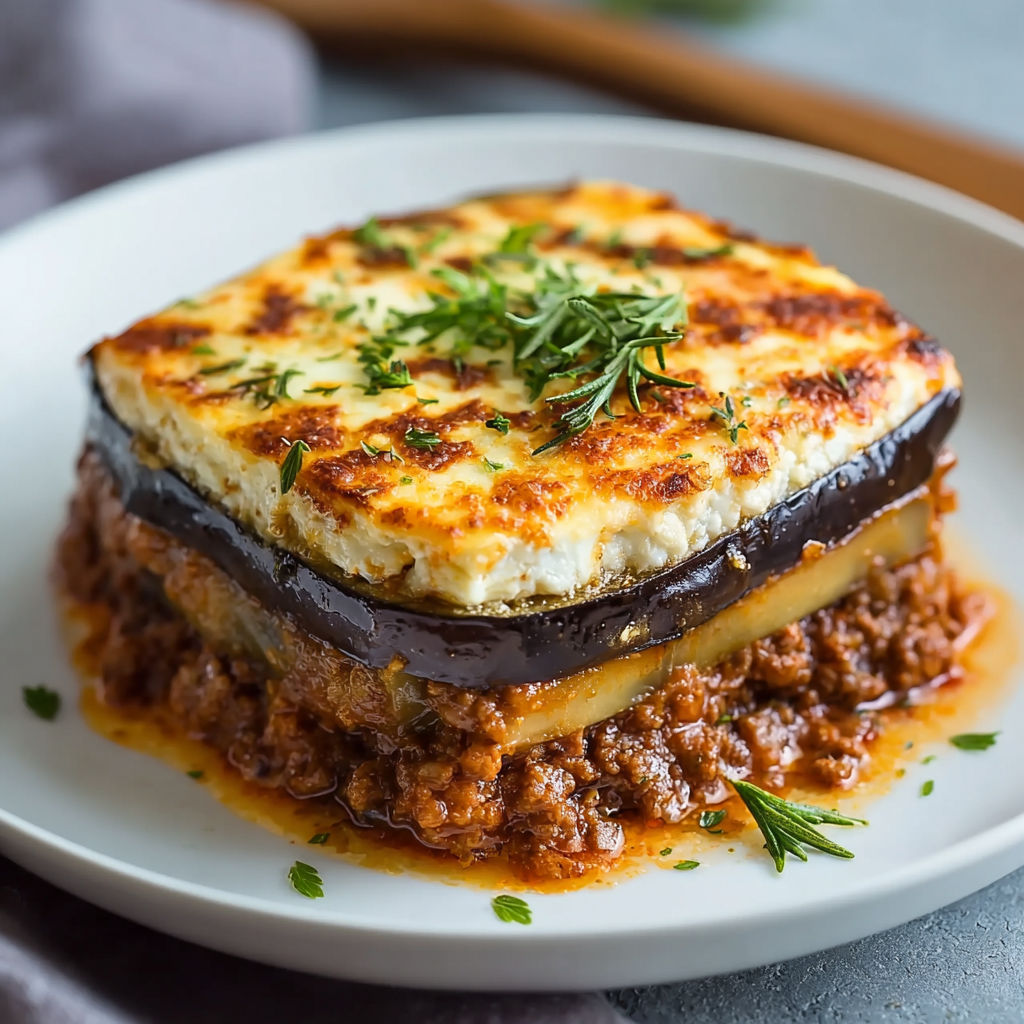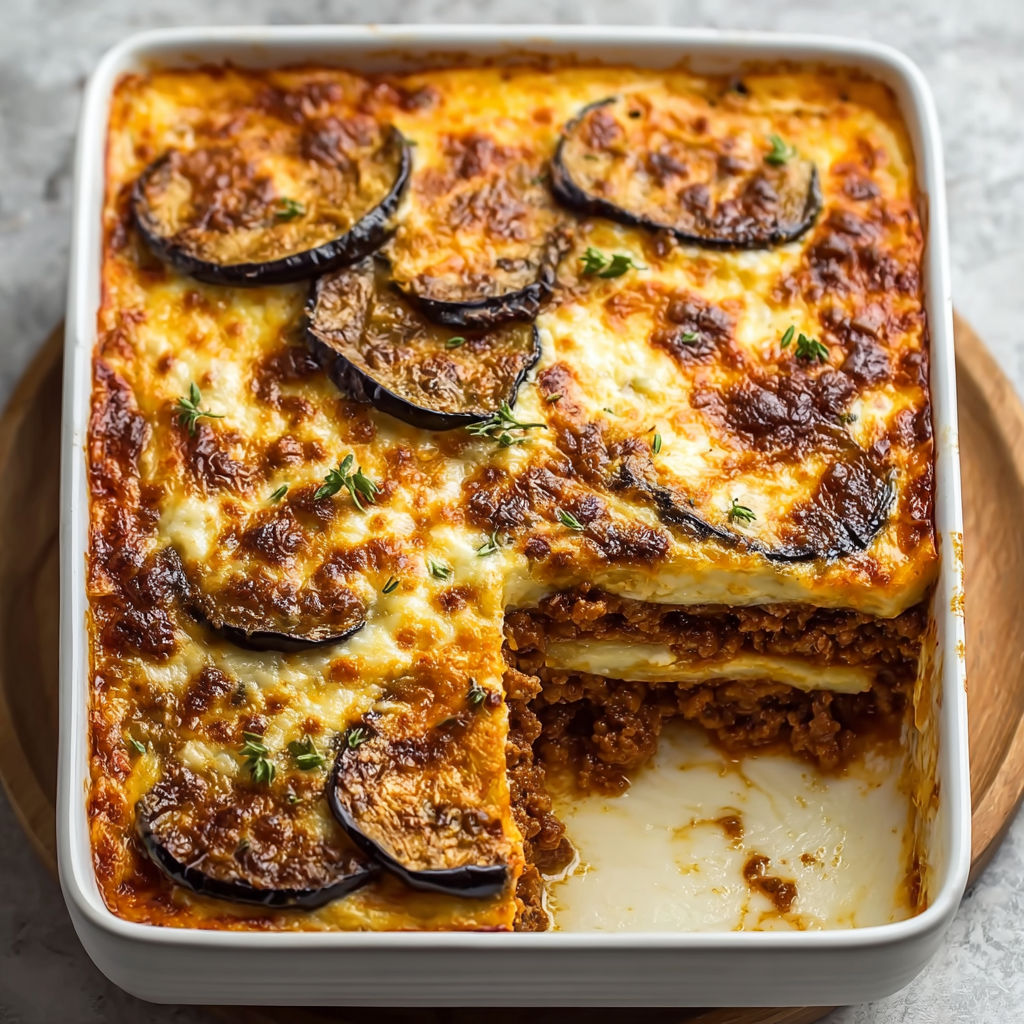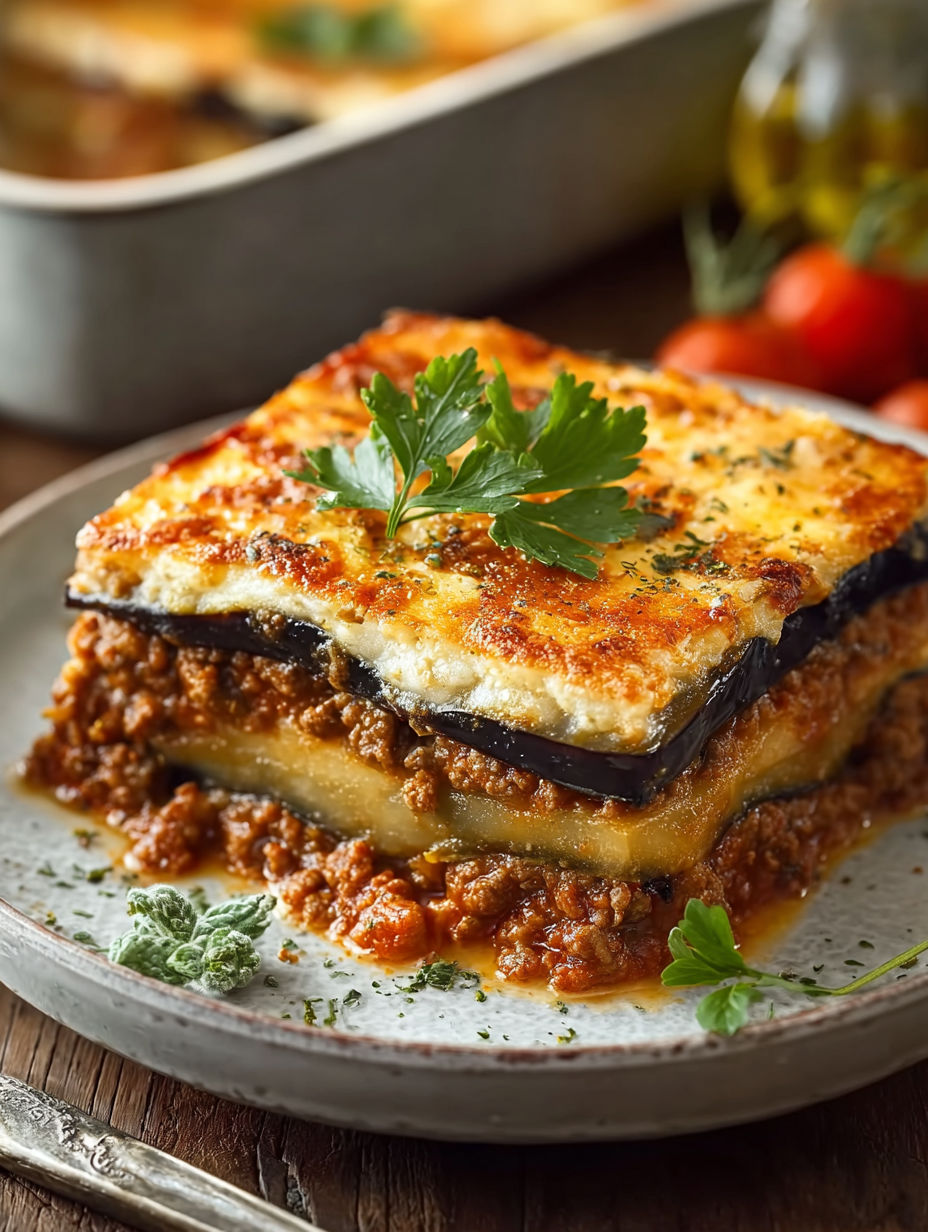 Pin
Pin
This comforting Classic Greek Eggplant Moussaka transforms humble ingredients into an unforgettable casserole that transports you straight to a taverna overlooking the Mediterranean. The creamy béchamel blankets layers of roasted eggplant and richly spiced meat sauce, creating a dish that's both elegant and deeply satisfying.
My Greek grandmother taught me this recipe when I was just twelve years old. Standing beside her in the kitchen, watching her hands work so confidently with the eggplant, I fell in love with the process almost as much as the finished dish.
- Eggplants choose firm ones with glossy skin and no soft spots for the best texture and flavor
- Ground lamb traditional and provides rich flavor but beef works wonderfully too
- Cinnamon the secret ingredient that gives authentic Greek moussaka its distinctive warm note
- Nutmeg adds subtle complexity to the béchamel sauce use freshly grated for best results
- Oregano dried Greek oregano has more intensity than Italian varieties look for it at specialty stores
- Butter high quality butter creates a silky béchamel that makes all the difference
- Eggs help the béchamel set properly into a custardlike top layer
- Tomatoes use San Marzano for their sweet flavor and low acidity
- Onion and garlic the aromatic foundation that builds depth in the meat sauce
How To Make Classic Greek Eggplant Moussaka
- Prepare the Eggplant
- First slice the eggplants lengthwise into quarter-inch planks. Sprinkle generously with kosher salt and arrange in a colander over the sink or a bowl. Let them sit for 30 minutes this crucial step draws out bitterness and excess moisture. After draining pat each slice thoroughly with paper towels until completely dry. Brush both sides with good olive oil and arrange on baking sheets. Roast at 400°F for about 20 minutes until they develop a beautiful golden color and become pliable.
- Brown the Meat
- Heat a large deep skillet over medium-high heat. Add the ground lamb or beef without any additional oil as it will release its own fat. Break it up with a wooden spoon and cook until no pink remains about 5 minutes. The meat should develop some caramelized bits which build incredible flavor.
- Create the Aromatic Base
- Add finely chopped onions to the browned meat and cook for 4 minutes until they begin to soften and turn translucent. Add minced garlic and cook for another minute until fragrant being careful not to let it burn. This aromatic foundation will permeate the entire dish.
- Develop the Sauce
- Pour in diced tomatoes with their juices then add oregano cinnamon salt and freshly ground black pepper. Stir to combine all ingredients ensuring the spices are evenly distributed. Reduce heat to medium-low and simmer uncovered for 20 minutes stirring occasionally. The sauce should reduce and thicken considerably this concentration of flavors is essential for authentic moussaka.
- Craft the Béchamel
- In a medium saucepan melt butter over medium heat until it begins to foam. Sprinkle in flour and whisk continuously for 2 minutes until the mixture smells nutty but hasn't browned. This roux will thicken your sauce beautifully. Gradually add warm milk about half a cup at a time whisking vigorously between additions to prevent lumps. Cook for 5-7 minutes until the sauce coats the back of a spoon. Remove from heat and let cool slightly for 2 minutes.
- Enrich the Béchamel
- In a separate bowl whisk eggs lightly. Take about half a cup of the warm sauce and slowly add it to the eggs while whisking constantly. This tempering prevents the eggs from scrambling. Pour this mixture back into the sauce whisking continuously. Add nutmeg and salt then taste and adjust seasoning if needed. The finished béchamel should be silky smooth and luxurious.
- Assemble with Care
- Begin with a layer of roasted eggplant slices in the bottom of a 9×13inch baking dish slightly overlapping them for stability. Spread the entire meat sauce in an even layer over the eggplant pressing gently to fill any gaps. Top with remaining eggplant slices creating a solid layer. Pour the béchamel over everything ensuring it reaches the edges and covers completely.
- Bake to Golden Perfection
- Place the assembled moussaka in a preheated 350°F oven and bake for 45-50 minutes until the top is beautifully golden and the edges are bubbling slightly. The béchamel should set completely and take on a custardlike texture. Remove from oven and this is critical allow it to rest for at least 15 minutes before serving. This resting period allows the layers to settle and flavors to meld.
The cinnamon in this recipe might seem unusual if you're used to only using it in sweet dishes but it's absolutely transformative. My grandmother always said the secret to proper moussaka is patience letting each component develop fully before bringing them together. When I make this dish now I can still hear her voice guiding my hands.
The Salt Secret
The salting step for eggplant is non-negotiable. Beyond removing bitterness it significantly improves the texture preventing the eggplant from becoming waterlogged during baking. This ensures your moussaka has distinct layers rather than turning mushy. If you're short on time you can reduce the salting to 15 minutes but don't skip it entirely. After roasting the eggplant should be tender but still hold its shape when handled.

Serving Traditions
In Greece moussaka is rarely eaten piping hot. It's typically served warm or even at room temperature which allows the flavors to bloom fully. Pair it with a simple Greek salad dressed with good olive oil and a squeeze of lemon. A glass of medium-bodied red wine like Agiorgitiko completes the experience. For a complete Greek feast add some warm pita bread and tzatziki on the side. The cool cucumber yogurt sauce provides a refreshing contrast to the rich moussaka.
Storage and Reheating
Moussaka actually improves with time as flavors meld and deepen. Store leftovers covered in the refrigerator for up to 4 days. For best results reheat individual portions in a 325°F oven for about 15-20 minutes until warmed through. Avoid microwave reheating if possible as it can make the béchamel separate and the eggplant rubbery. This dish also freezes beautifully. Portion completely cooled moussaka cut it into individual servings wrap tightly and freeze for up to 3 months. Thaw overnight in the refrigerator before reheating.

Recipe FAQs
- → Can I prepare moussaka ahead of time?
Yes, moussaka is excellent for make-ahead meals. You can assemble it completely, refrigerate for up to 24 hours before baking, or freeze unbaked for up to 3 months. If frozen, thaw overnight in the refrigerator before baking. You may need to add 10-15 minutes to the baking time if cooking from cold.
- → Why do I need to salt the eggplant?
Salting eggplant serves two purposes: it draws out bitter juices and reduces the amount of oil the eggplant absorbs during cooking. After salting, be sure to rinse and thoroughly pat dry the eggplant slices before roasting for the best texture and flavor.
- → What can I substitute for lamb in moussaka?
Ground beef works perfectly as an alternative to lamb. For a lighter version, try ground turkey or chicken. Vegetarians can use a plant-based meat substitute, lentils, or a mixture of chopped mushrooms and walnuts to create a similar texture and savory flavor profile.
- → How do I know when the béchamel sauce is thick enough?
The béchamel is ready when it coats the back of a wooden spoon and when you run your finger through it, the line remains clear. It should have the consistency of thick pancake batter. If it becomes too thick, gradually whisk in a little more warm milk until you reach the desired consistency.
- → What sides pair well with moussaka?
Moussaka is quite hearty on its own but pairs beautifully with a simple Greek salad, crusty bread, or lightly dressed greens. For a complete Greek meal, serve with tzatziki, hummus, and warm pita bread. A light, crisp white wine like Assyrtiko or Sauvignon Blanc complements the richness of the dish perfectly.
- → Can moussaka be made gluten-free?
Yes, moussaka can easily be made gluten-free by substituting the all-purpose flour in the béchamel sauce with a gluten-free flour blend, cornstarch, or rice flour. The rest of the ingredients are naturally gluten-free, making this a simple adaptation for those with gluten sensitivities.
